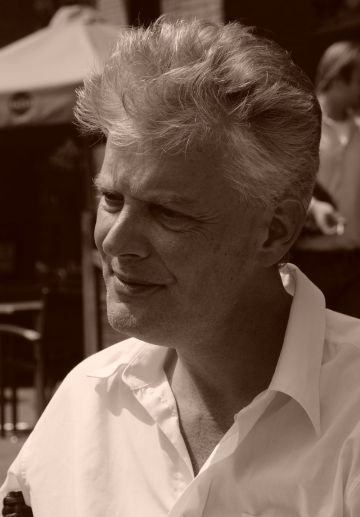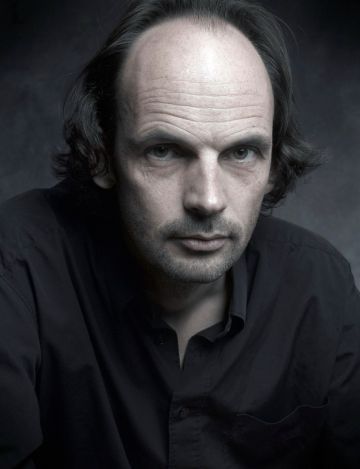Composer Bart Visman and lyricist Marc Pantus create a cycle of three songs about an artist's experiences on stage for three consecutive Competitions 2021-2026. For the LiedDuo and Opera | Oratorio competitions in 2021-2022 the first song, titled 'Het Goud van Vermeer' / 'Vermeer's Gold' was performed. Both composer and lyricist are now working on the second song in this cycle. More information will follow.
Prize Song 2021 & 2022
- Titel: “Het Goud van Vermeer" | “Vermeer’s Gold”
- Composer: Bart Visman (*1962 Naarden)
- Lyricist: Marc Pantus. English translation: Brent Annable
- Duration: approx. 5 minutes
- Two instrumentations: piano & voice (2021)| orchestra & voice (2022)
- For six different voice-types
>> Interview with the creators Bart Visman & Marc Pantus <<
Commissioned by the International Vocal Competition
's-Hertogenbosch as compulsory piece for the IVC 2021 and 2022.
Published under direct management of Stichting
’s-Hertogenbosch Muziekstad.
Published by Deuss Music, The Hague, via www.deussmusic.com.
>> Download sheet music <<
For perusal only. Participants selected for the Semi-finals receive clean copies of the sheet music.
Competition participants decide for themselves whether they perform the Dutch or English text.
Since 2002 a compulsory vocal work has been commissioned for the competition. The following Dutch composers have composed pieces for the IVC: Micha Hamel (2002), Rob Zuidam (2004), Robin de Raaff (2006), Roel van Oosten (2008), Wilbert Bulsink (2010), Jeppe Moulijn (2012), Willem Jeths (2014), Monique Krüs (2016), Sylvia Meassen (2018). In 2021 Bart Visman composed the compulsory piece.
Van Riemsdijk Prize: €2,500
The "Van Riemsdijk Prize" will be awarded
to the Duo (2021) or singer (2022) that according to the jury is the best interpreter of the compulsory
piece by Bart Visman. The compulsory piece will be performed by all Duos in the
Semi-Finals. Two Duos will be nominated to perform the composition during the
Finals on the 21st of November 2021. Competition participants decide for
themselves whether they perform the Dutch or English text.
Composer Bart Visman and lyricist Marc Pantus (himself
a bass-baritone) wrote a song that is directly connected to the experiences of
a singer.
"You have a date in your calendar on which you
sing a new work. You don't know it, you never really know how much preparation
it requires. And yet, time and time again, you manage to make music with the
orchestra, your colleagues and sometimes the choir. That seems self-evident,
but it is not. This song is about what a candidate feels in a Competition. "
Marc Pantus
Het Goud van Vermeer
Niemand weet hoe het moet
niemand weet hoe het kan
niemand weet hoe
ik ben opgekomen
ik ben niet op de trap gestruikeld
ik doe of ik rustig ben
ik ben rustig
ik ben rustig
ik glimlach naar het publiek
ik ken het lied
het liedje gaat niet over mij
(is er iets te zingen over mij?)
maar het heeft mij nodig
VERBODEN TE LIEGEN OP HET PODIUM
de leraar weet het niet
de jury weet het niet
de pianist weet het niet 1
u weet het niet
niemand weet het
de leraar doet het niet
de jury doet het niet
de pianist doet het niet 2
u doet het niet
ik doe het
"Let op!
Wacht niet met leren liegen
(ik heb dat zelf te laat geleerd)
tegen de pianist, het koor, orkest, regie, 3
kritiek, piano, akoestiek, publiek,
roem alles — juist als het onterecht is."
en dan
– gelukkige catastrofe –
ineens iets van goud
of blauw
zonder contouren
– zoals Vermeer het deed –
iets van goud
een zuil, een ei
op een Ja
of op een Amen
en niet liegen
niet liegen
ik ben naar voren gelopen
ik ben niet gestruikeld op de trap
ik heb geknikt, vriendelijk
heb niets
ik heb hier iets te zoeken
kijk, er staat een kruisje op de vloer
hier is het
hier is het veilig
hier moet ik wezen
het liedje gaat niet over mij
maar het kan niet zonder mij
ik ben hier
ik ben nu.
1 de dirigent (in de orkestversie)
2 de dirigent (in de orkestversie)
3 de dirigent (in de orkestversie)
Vermeer’s Gold
No-one knows how to do it
no-one knows how they can
no-one knows how
I walked up to stand here
did not trip coming down the stairway
pretend I’m not nervous
I’m not nervous
I’m not nervous
I smile at the audience
I know the song
the song is not about me
(what is there to say about me?)
but the song still needs me
LYING PROHIBITED IN THE AUDITORIUM
the teachers do not know
the judges do not know
the accompanist does not know 4
you do not know
no-one knows
the teachers do not do it
judges do not do it
accompanists do not do it 5
you do not do it
I do it
"Listen here!
Don’t wait to practice lying
(I learned it far too late myself)
to the accompanist, the choir, the orchestra, 6
the critics, piano, acoustics, the audience,
sing praises – right when they’re undeserved.”
and then
– O fortunate disaster –
a gift made of gold
or blue
fluid and flowing
– just like Vermeer would do –
made of gold
a column, an egg
on a ‘Ja’
or on an ‘Amen’
and no lying
no lying
and so I’ve come here before you
I did not trip up upon the stair
I gave a nice, friendly nod
I have nothing
but here I have a purpose
see, there is a cross here upon the floor
here it is
this is a safe place
this is where I must be
the song is not about me
but it cannot do without me
I am here
I am now.
4 the conductor doesn’t know (orchestral version)
5 the conductors don’t do it (orchestral version)
6 the conductor (orchestral version)
Bart Visman | Composer
Bart Visman (Naarden, 1962) studied at the Conservatorium van Amsterdam with Daan Manneke and Geert van Keulen. In 1994 he received the incentive award from the Amsterdam Fund for the Arts (AFK) for his orchestral work Orchestrales.
Bart Visman's oeuvre includes chamber music, orchestral music, opera and songs. He has composed for the NTR: Zaterdagmatinee (Ces concerts, riches the cuivre; Rumore), Friday Vredenburg series in Utrecht (Serenade), The Gents (New Heaven!), the Nieuw Ensemble (Phoenix Song), the Dutch National Student Orchestra - NSO (Grande Valse Brilliante), the Limburg Symphony Orchestra and Barbara Hannigan (Sables, Oxygène) and Amsterdam Sinfonietta (Sinfonietta).
He has also written orchestrations of such music as Images Oubliées by Debussy for the Royal Concertgebouw Orchestra and Les Mamelles de Tirésias, a short opera by Poulenc. This last arrangement for chamber orchestra has been successfully performed by Opera Trionfo and the Nieuw Ensemble, Grand Théatre of Luxembourg, Wolf Trap Opera, and the youth department of Dutch National Opera among others, and conservatories in Maastricht, Leipzig, Karlsruhe and Philadelphia.
Barbara Hannigan and the Limburgs Symphony Orchestra conducted by Ed Spanjaard premiered the song cycle 'Sables, Oxygène'. Later Hannigan also performed '...Kam ein Vogel' directed by Cherry Duyns. In 2012 Spanjaard also conducted the premiere of 'Phoenix Song' which was commissioned by New Ensemble. Last year 'Rumore' premiered at the Concertgebouw. Performed by Radio Philharmonics Orchestra conducted by Stéphane Denève.
Bart Visman has orchestrated and adapted various pieces for different ensembles and orchestras. Poulenc's opera 'Les mamelles de Tirésias', 'La musica viva' by Donizetti and more recent 'Images oubliées' by Claude Debussy which was premiered by the Royal Concertgebouw Orchestra conducted by David Robertson. Visman also composed and arranged for television and film.
He has created a new Opera together with Marc Pantus, 'De allochtoon'. Together with the same text writer he created a song cycle for tenor and IVC-Prizewinner Peter Gijsbertsen “Zeven levensliederen en een aanslag”.
In his music, Bart Visman seeks to give musical expression to all that is higher, grander, and all that draws people out of the mundane. For this he uses all the musical resources (both tonal and atonal) at his disposal. In his choice of texts he returns again and again to such significant themes as life, love and death, producing music that is full of longing, at once joyful and melancholic.
Marc Pantus | Bass-baritone, stage director, writer
Marc Pantus initially studied theatre design at the Rietveld Academy of Visual Arts in Amsterdam where he graduated in Audio-visual Design in 1989. Immediately afterwards he began his singing studies at the Utrecht Conservatoire and at the Royal Conservatoire in The Hague. There he also followed the opera class and obtained the diploma Performing Musician in 1997.
He was selected for the Steans Institute for Young Artists at the Ravinia Festival in Chicago (U.S.A.), where he was taught by Thomas Allen, Christa Ludwig, Barbara Bonney, Elisabeth Söderström and Roger Vignoles, among others. In 2001 he founded i piccoli holandesi serious comedy & opera. Originally purely focused on comic opera repertoire from the eighteenth century. Since then Marc Pantus has sung, designed and directed productions by Johann Adolf Hasse and Francesco Bartolomeo Conti that have received acclaim in the press. The productions could be seen at the Holland Early Music Festival in Utrecht, the Aqua Musica Festival in Amsterdam, the van Wassenaar Festival and the Voi-z Festival in Zwolle. After these productions Marc Pantus made Don Quijote, cut & paste opera in 2005 and Sancho Pança in 2006, the latter consisting for a large part of a never before performed opéra comique by Philidor. At the beginning of 2009 Pantus made Doodleuk, a solo performance with cantatas by Bach and Telemann and a story by Thomas Bernhard.
In the summer of 2009 he was director and designer of Svadebka!, the village wedding that included the world premiere of Stravinsky's Les Noces and Histoire du Soldat. The performance premiered at the Grachtenfestival in the Hermitage Amsterdam and was praised in the national press for its clarity and inventiveness. To crown the series of performances, the production was performed as a Queen's Day concert at Noordeinde Palace and broadcast on Dutch television. In 2011 he wrote and directed the performance Don Quichot and Sinterklaas for De Magische Muziekfabriek and the Radio Kamer Filharmonie, including new work by Bart Visman and the opera El retablo de Maese Pedro by Manuel de Falla, in which he also performed the role of Don Quichot. For vocal ensemble Frommerman Pantus wrote and directed the performance FrommerFranz, an ode to Schubert. The press was unanimously positive about this production.
For Wishful Singing 'female a cappella' he made the performance Victory! - from Bingen to Boogie with works by Hildegard von Bingen and newly written compositions inspired by Mondrian's painting Victory Boogie Woogie. For and with the Cococollectief he directed Schubert's Winterreise in the adaptation by Maurice Lammerts van Bueren. Soon the Nederlandse Bachvereniging will play his direction of Bach's Kaffeekantate. This will also be recorded on film for "All of Bach". As a writer Marc Pantus has worked on scripts and scenarios for vocal ensembles such as Frommermann, the Coco Collective and Wishful Singing.
Marc wrote the libretto for the opera ‘De
Allochtoon’ by Bart Visman. Visman also composed the work for the large choir
and symphony orchestra Rumori and the song cycle Seven Songs of Life and an
Assault commissioned by Peter Gijsbertsen on the occasion of the presentation
of the Dutch Music Prize.
www.marcpantus.nl



